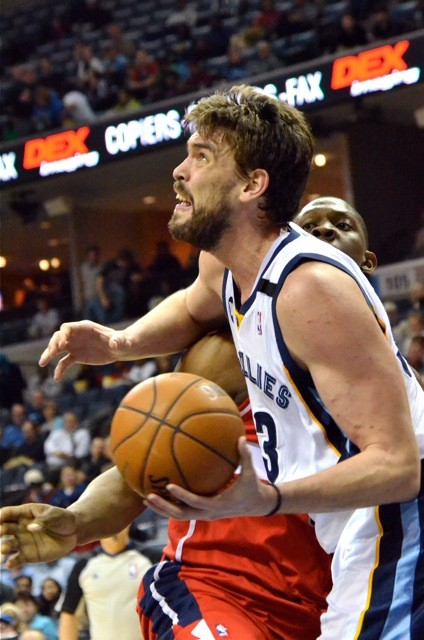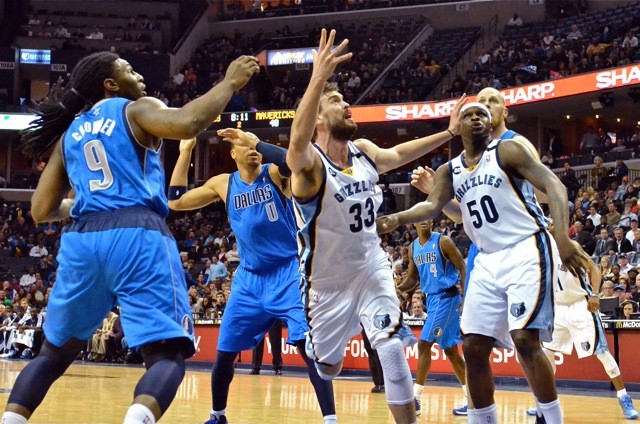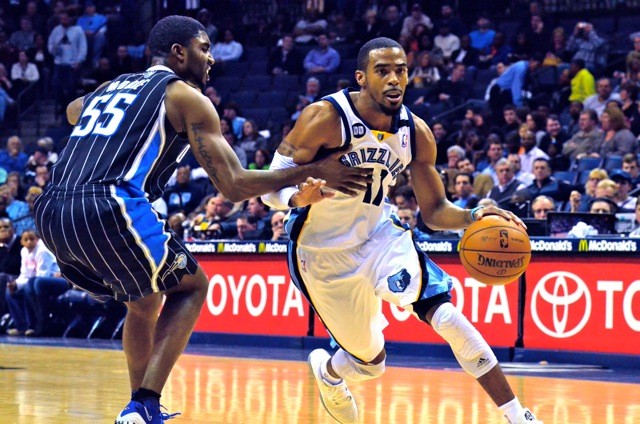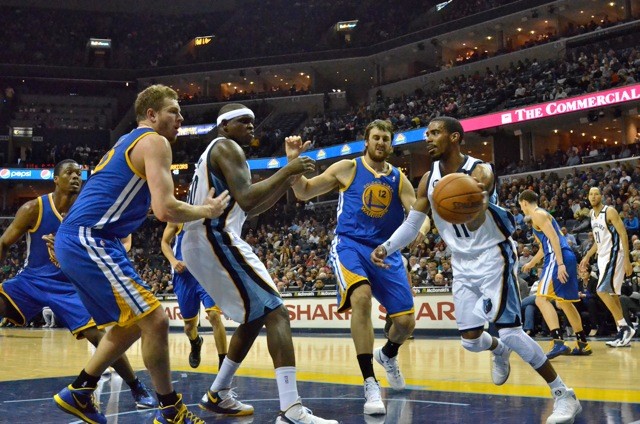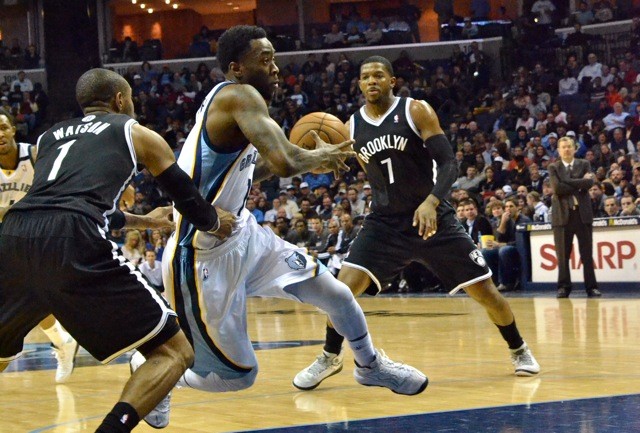The Memphis Grizzlies emerged from last weekend’s NBA All-Star break still on pace for the best record in franchise history but with many questions to answer over the season’s remaining 31 regular-season games.
If the team, projected to finish fifth in the Western Conference even before the trade of longtime would-be star Rudy Gay to the Toronto Raptors, slides further than that, then jettisoning Gay will obviously be seen — fairly or not, given the preexisting downward trajectory — as a turning point. But if the Grizzlies maintain their ground or better, the correction will have begun not so much with the deal itself but with the delayed acceptance of it.
The Grizzlies, from the head coach down through the locker room, wasted a few days pouting in the wake of the Gay trade, despite the fact that the team’s slide since November had coincided with Gay’s worst season since his rookie year.
The trade itself was a reminder of something we learned with the Pau Gasol deal: that, in a lot of quarters, any deal made by the Grizzlies that includes financial motivation will be seen entirely through that prism.
Make no mistake, with new controlling owner Robert Pera acknowledging some initial cash-flow issues in the immediate wake of his purchase agreement with Michael Heisley, there are legitimate questions about the wherewithal of the new ownership group. But those questions can’t begin to be answered until we see how they conduct the coming off-season. The problem with drawing such conclusions from the Gay deal, of course, is that “financial reasons” and “basketball reasons” are becoming increasingly inseparable in the NBA. Gay is set to make north of $19 million at the conclusion of his current contract without having ever made an All-Star team. In a league with strict rules that tie player payroll to methods of player acquisition, that’s a poor allocation of resources, no matter your market.
Nevertheless, the deal was disruptive, and the team seemed very fragile in its aftermath, with Lionel Hollins seemingly incapable of making public statements without generating controversy and the team’s defensive effort looking near non-existent in the first half of a road loss to the Atlanta Hawks.
But the team rallied to play a competitive second half in Atlanta, and, afterward, team leaders such as Marc Gasol and Tony Allen responded with tough-minded comments that went beyond the usual locker-room platitudes. A day and a half later, Hollins used his pre-game press availability to finally end the mourning. He didn’t pretend to approve the deal, but he did re-engage the season’s challenge.
“Have I been emotional about the trade? Yes,” Hollins said. “But I don’t want it to be taken that I can’t move forward and for my players to take it that I can’t move forward. Because I have and I will. And I expect them to.”
This “calming-the-waters” address was at once emotional, positive, and tinged with defiance. It was also effective, because an hour later, his team took the floor and replicated that tone in a rousing win over the playoff-seeding rival Golden State Warriors, launching a three-game winning streak going into the break and ushering the post-trade malaise out of the organization.
This winning streak brought the Grizzlies to 4-2 post-trade. That’s a small sample size and one made even less persuasive given that five of the six games were at home and four of the six were against teams with losing records. But these games still offer a useful glimpse of the way the Grizzlies may play after two trades that turned over more than a third of the team’s roster.
Removing Gay, who, over the course of the season, has led the team in minutes and used — via shot attempts, assists, and turnovers — nearly a quarter of the team’s possessions while on the floor, created a huge hole in the team’s offense. And replacement small-forward Tayshaun Prince was never going to — really, was never meant to — fill it.
The idea was that Prince would use his possessions more efficiently while fostering better overall team play on the offensive end. Though six games post-trade, so far so good.
There was some thought that the extra touches freed up by Gay’s departure would shift heavily to Zach Randolph, but that has not been the case so far. Randolph’s usage rate since the trade has held steady, and while he’s rebounded from his historically rough January, his still-all-star-level production this season hasn’t come with much that would convince onlookers he can still put a team on his back the way he did two seasons ago.
Instead, these extra touches have essentially been dispersed, with Gasol leading all starters in usage rate since the trade. Fittingly, exchanging an offense driven by a turnover-prone isolation scorer in Gay for one driven by the team’s most talented combo passer/scorer in Gasol has had a dramatic impact.
Prior to the trade, the Grizzlies’ team assist ratio and overall offensive production had both fallen to the bottom third of the NBA. In the six games since the trade, against a pretty solid array of defenses, the team has notched an assist ratio that would be in the league’s top five and an overall scoring rate that would be approaching the top 10. People worried about replacing Gay’s team-leading 17 points per game, but, in reality, Gay’s low-efficiency ball dominance may have been a drag on the offense.
For the past few seasons, the over-emphasized question for the Grizzlies has been: Randolph or Gay? The answer, unsurprisingly, may turn out to be Gasol.
Gasol is probably a slightly more prolific scorer on the (left) block than he is in the high post. There, he can score with rumbling hooks and short turnaround jumpers and is more likely to draw fouls. But the team’s overall offense seems to function best with Gasol stationed around the free-throw line, where he can direct the offense out of the high post or form a pick-and-roll partnership with Conley.
Here, Gasol can send bounce passes to backdoor cutters or set up frontcourt mates — namely Randolph — for low-post attempts. If that’s not there, Gasol can simultaneously deliver the ball to curling shooters — primarily Conley — while hip-checking their defender to free them up for open jumpers. And if he can’t make a play for someone else, Gasol can torch defenses with his own near-50 percent mid-range shooting.
While Conley’s individual production has not been as strong as it was in his unsustainably superb November, the team’s offensive performance with him on the floor has been nearly as good, and he’s combined solid shooting with his best assist ratio of the season.
While the early returns on the team’s post-trade offense have been very encouraging, there’s some concern on the other end, where the team’s once-elite defense has slipped a little. The post-trade defensive efficiency would still land the Grizzlies in the league’s top 10 but several spots lower than the overall second-place rank for the season.
The conventional wisdom after the trade was that the Grizzlies would miss Gay’s scoring and shot creation, but they would become even more solid on the defensive end. But Gay’s defense may have been as underrated as his offense was overrated, and exchanging Gay’s minutes on the wing for aging Prince and physically weak Austin Daye has drained the team of some dynamism on that end. An even bigger concern may be Gasol. The team’s defensive efficiency with Gasol on the floor, while still very good, has slipped each month, and the Grizzlies need Gasol, even with an expanded offensive load, to get back to the all-NBA-caliber defense he displayed earlier in the season.
Still, the balance the team has displayed before the trade is more promising going forward than the all-defense/no-offense game the team had played for much of the previous two months. And the realistic goal before the trade — not “winning a title,” which was always loose talk, but fielding a competitive playoff team — seems just as realistic now.
